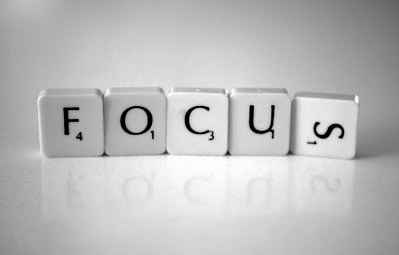Pay Deep Attention to Get More Done

"Give whatever you are doing and whoever you are with the gift of your attention." ~Jim Rohn
With one of my strengths being learner (StrengthsFinder 2.0), I did some post-graduate work a few years ago in the Neuroscience of Leadership at the NeuroLeadership Institute. NeuroLeadership is an emerging field of study focused on bringing neuroscientific knowledge into the areas of leadership development, management training, change management, education, consulting and coaching. This field helps individuals and organizations fulfill their potential through better understanding how the human brain functions at individual, team, and systemic levels. The four domains of focus in these areas are:
- Decision making and problem solving
- Staying cool under pressure
- Collaborating with others
- Facilitating change
It has been interesting to understand more about these areas from a scientific point of view and it has helped me better understand why individuals who are normally rational, smart people sometimes do stupid things. I'd like to specifically talk about attention. Attention is defined as "the ability to focus on a particular sensory input, while inhibiting the urge to focus on distractions elsewhere in the environment.” We are always choosing where to place our attention.
"When we talk about understanding, surely it takes place only when the mind listens completely - the mind being your heart, your nerves, your ears - when you give your whole attention to it." ~Jiddu Krishnamurti
Here are just a few things I've learned about attention:
- It is impossible to learn and remember information to which the brain has not paid attention.
- Our brain is not designed to remain attentive and focused on the same stimuli for extended periods of time. It cannot hold a lot of information for a long period.
- The brain needs down time to process all it has taken in which is why sleep is critical.
In the world competing for our attention, we actually go through three processes before we can pay attention.
- We are alerted that something is happening.
- We determine if it is good or not so good.
- We make the decision of how to react.
All these steps are done in a very, very short span of time. And this keeps repeating over and over and over.
- We pay attention to things like emotions, threats and sex. Regardless of who you are, the brain pays a great deal of attention to these questions: Can I eat it? Will it eat me? Can I mate with it? Will it mate with me? Have I seen it before? Is it safe? Is it unsafe?
- The brain is not capable of multi-tasking. We can talk and breathe, but when it comes to higher level tasks, we just can't do it.
- Driving while talking on a cell phone is like driving drunk. The brain is a sequential processor and large fractions of a second are consumed every time the brain switches tasks. This is why cell-phone talkers are a half-second slower to hit the brakes and get in more wrecks.
I am finding more and more that multi-tasking does not work even though workplaces and schools actually encourage this type of behavior. Walk into any office and you'll see people sending e-mail, answering their phones, Instant Messaging, Facebooking and Instagramming—all at the same time.
Research shows your error rate goes up 50% and it takes you twice as long to do things. So, stay focused and pay attention. Deep attention.

0 comments
Leave a comment
Please log in or register to post a comment